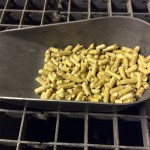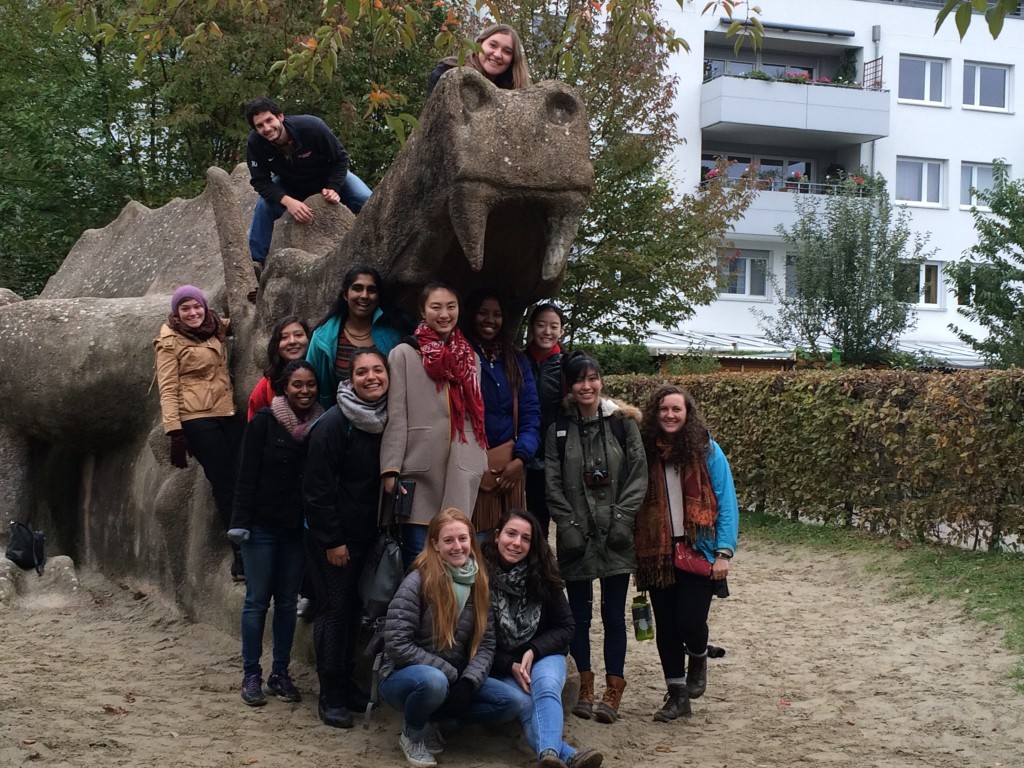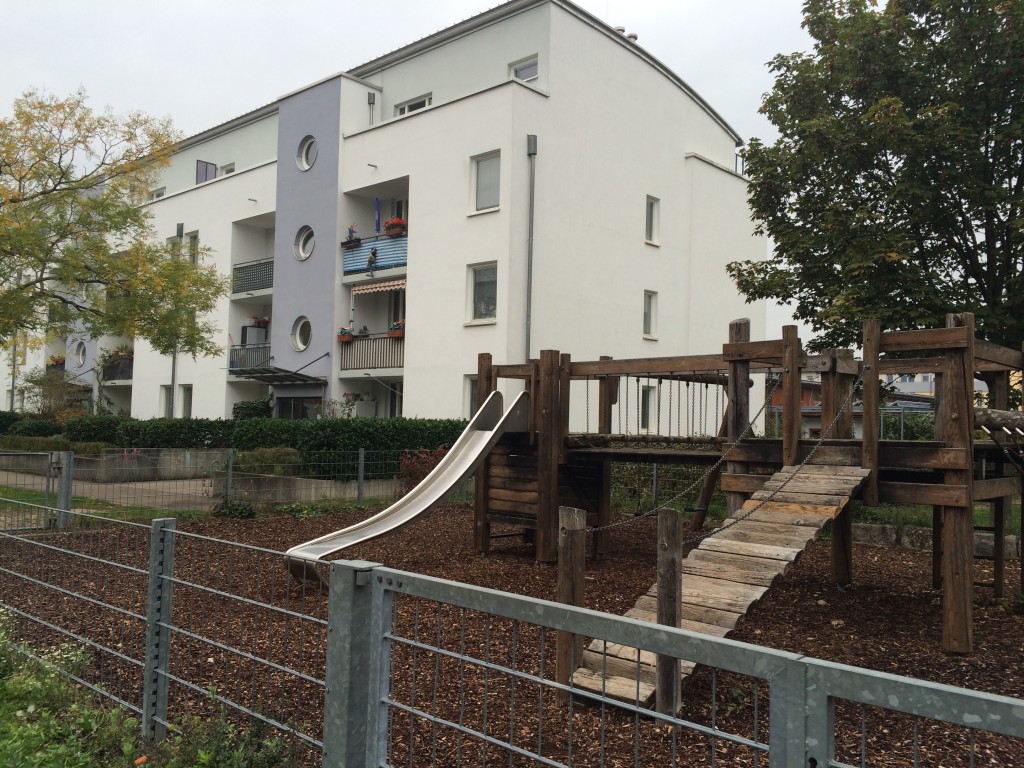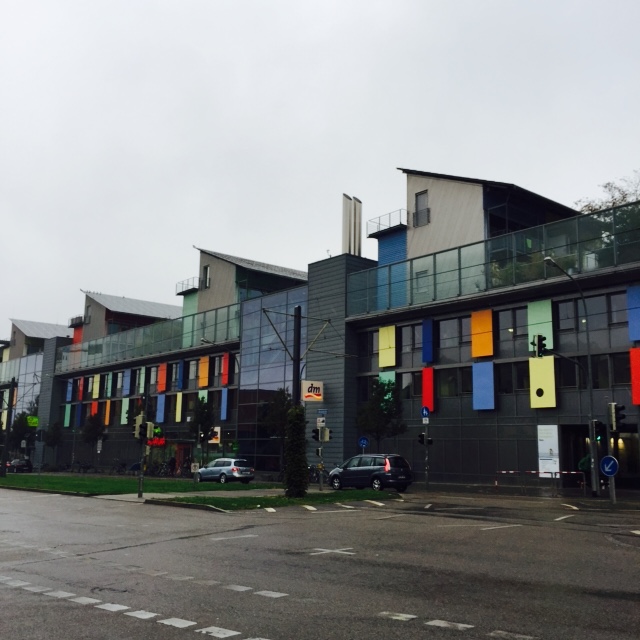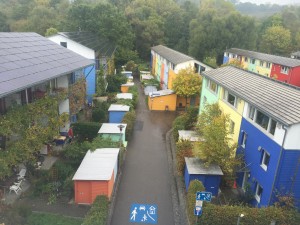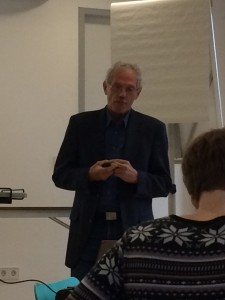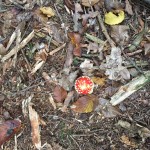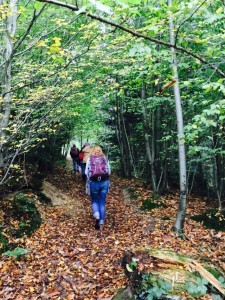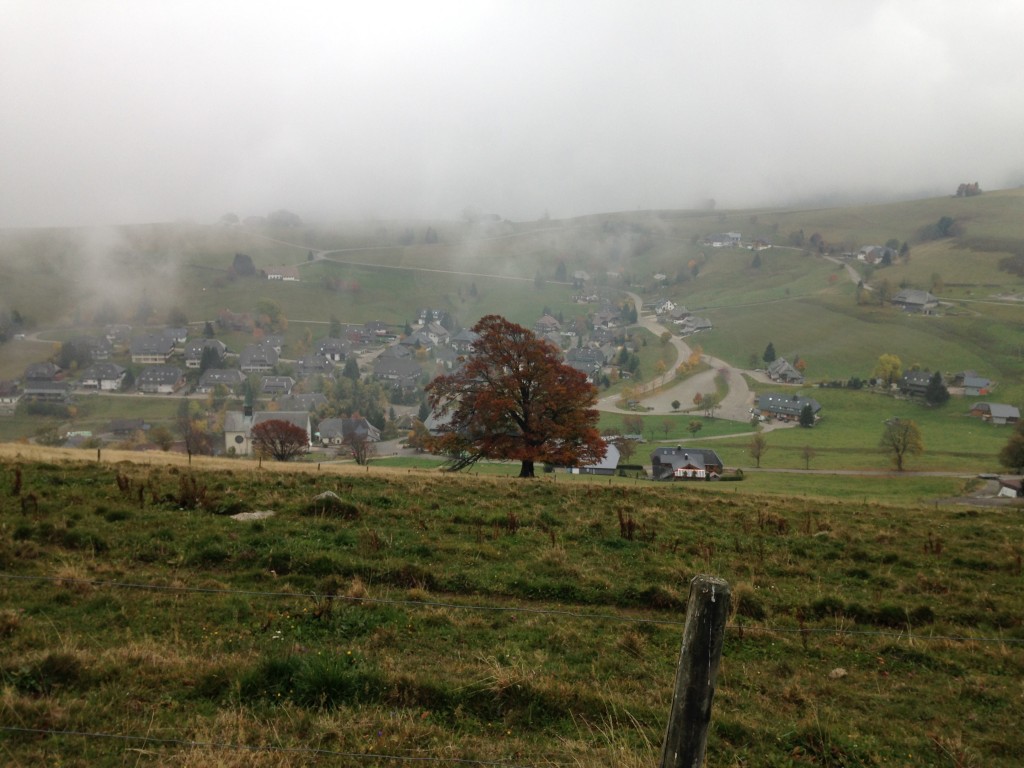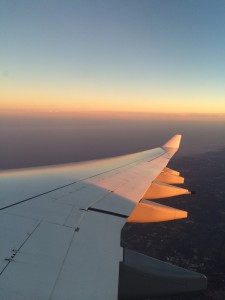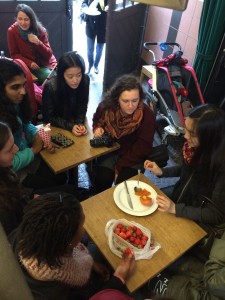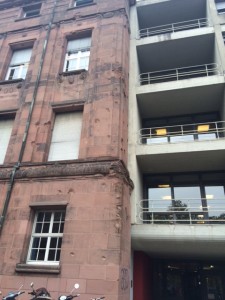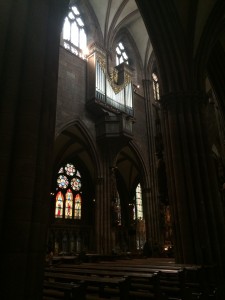Train, bus and our feet
carry us into cool clouds
where sun is now weak.
Author Archives: Sarah Theobald
Getting Solar
I’m writing from the lobby of our hotel, where there’s a jazz combo playing in the lounge on the other side of the wall, celebrating the 140th anniversary of the Victoria’s founding, and the 30th anniversary of the current owners’ proprietorship. We aren’t attending the fancy dress party, but I’m happy to be taking advantage of the great music.
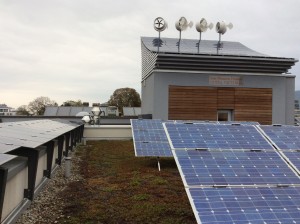
Photo-voltaic cells, wind turbines, and water heating cylinders on the roof of the Hotel Victoria (Dostal)
This morning, we had the opportunity to get a behind-the-scenes look at greening improvements made by the owners to the Victoria, making it a carbon neutral hotel. “It’s interesting that the hotel doesn’t seem any different when you walk in. There’s nothing that requires effort on the part of the guest” said Annika, in comparison to our previous conversations at Innovation Academy about making sure constituents understand and engage with technologies and practices comfortably.
We climbed to the roof to view the solar panels and tiny wind turbines, then trekked to the cellar to see the wood pellet burning heating system.
Our other guest commentator, Catherine, said that “this trip has made me realize the creative ways people are harnessing technologies that don’t occur to me, in ways that aren’t much harder than what we’re already doing.” Professor Don Barber was also able to share that some of the same cooling technology here is used at a Haverford athletic facility, which students will be able to visit on our return.
Our next tour was of Riesenfeld, which Catherine described as “a responsible community.” Once the open collection ground for the city’s sewer systems, the land was was intentionally reformed, “from the design contests about how it was going to be laid out, to all the different ways the architects made the structures energy efficient.” Annika notes that “it’s also important that there was a competition – it was digging into the skills that architects had to make it green. It was an important publicity element.” From four-story apartment buildings to single family homes, everything in the development has solar panels, insulated walls, and other eco-design features. There are green spaces, creeks, and many many playgrounds between rows of houses, all with pedestrian zoned walkways and bike storage sheds.
Catherine wondered about the circumstances that arose to allow such a project, though, and whether they are applicable elsewhere: “That takes a lot of time and effort, and a specific way of thinking about how to build a community and systems that will allow that kind of thought and intention [to living sustainable].” Annika also picked up on an interesting parallel, that “this region that focuses on sustainability also focuses a lot on children and childhood education in general, and specifically on sustainable practices, even though the population of Germany is aging.” Riesenfeld does have a central gymnasium (high school) and several kindergartens (primary schools) around which the housing developments are built, as well as a community center and ecumenical church right next to the tram stop. The focus is clearly on young families, who may find it less expensive to live here than closer to the city center.
Our last stop of the day was on the other side of Freiburg, at the Fraunhofer Institute for Solar Energy Systems, which is the largest solar R&D institution in Europe, and Annika’s favorite visit thus far. “I was a little upset that I’m not a natural science major or engineer today because I couldn’t contribute to their work, and I’m so excited by it.” Catherine found the visitor’s hall (where prototypes are displayed and photos are forbidden) “like being at Stark Industries, and [she] was geeking out a little bit.” We were given an overview of the kinds of projects the Fraunhofer undertakes, and the four areas of focus for their energy research: efficiency, conversion, distribution, and storage. Then our tour guide took us outside to the hydrogen fueling station, where we got to see a prototype of a zero emissions car, and Annika had some concerns.
“I was a little disappointed by the car… it looks like a normal car, but it has zero emissions, which was cool. But I feel like the issue is actually where the car parts are coming from, how they’re being manufactured, with what fossil fuels, and the impact that the car has before it’s even driven off the lot. And I asked the tour guide about it, and she was really focused on the zero emissions nature of the car. Looking at it more holistically, there’s a long way to go.”
Catherine added that “this trip is really focused on how communities do things, but what we use still has to be produced somewhere, and a lot of the production is done in an irresponsible way.”
Tomorrow morning, we leave Freiburg for St. Peter, a small mountain village about 20 km from the city, where we will sleep for the rest of our trip (though we’ll be back to visit other sites in Freiburg on Monday and Tuesday next week). I asked the students to reflect on their experiences thus far, and Annika brought up the vastness of climate change as an issue. “In class we’ve talked about problems now, and things that will occur and [the trip] has been helpful in making the issue much more accessible. Policy is implemented on national, state, and local levels, and seeing that [play out in Germany] has been more inspiring than a lot of the broader and gloomier readings we’ve done in class.” The stories we will hear in St. Peter (including our meeting tomorrow with a farmer who went out and bought a wind turbine because he was tired of waiting for the town to get one) bring that accessibility to an even more personal level, especially because Professor Bob Dostal has been living part time in the village for over a decade.
About our guest commentators:
Annika Cole is a sophomore International Studies major at Bryn Mawr College. She grew up surrounded by environmentally conscious and active adults, and was drawn to this 360 because she wanted to incorporate that education and awareness fostered in her into her curricular pursuits. As you may be able to tell, she’s having a great time on this trip, but she really loves her horse, and looks forward to riding again when we get back Stateside.
Catherine Rowen is a sophomore at Bryn Mawr College. She used to have nightmares about climate change as a kid, though she’s cooled down since then (unlike the planet!). As an archaeology major, she has been concerned that her studies focus on things that happened in the past to dead people, and was excited that this 360 gave her the opportunity to engage on these issues and a sense of what she could do as individual to make a difference. When she isn’t figuring out how to apply what she’s learning to archaeology, she’s playing cello in Blacktop, a band on campus.
Don’s Daily Haiku
Quote
Fraunhofer ISE
illuminates path to a
carbon-free future.
Don’s Daily Haiku
Quote
A former wasteland
becomes family haven
with careful planning
Getting Philosophical (with Science Majors)
“Science is not the end of the story. It’s the beginning, really.” This is the through-line our two guest commentators, Jasmine and Nicole, found for today’s lectures in and around Freiburg. We began with an overview of Freiburg from a sustainable development perspective, given by our guide yesterday at the Innovation Academy, Steffen. Some of the Growth and Structure of Cities majors were particularly struck by his slides about the central train station, which is really constructed as a transportation hub. Regional trains, local trains, tram lines, and bus routes all converge there, but the complex also includes a bike parking building, and the car share garage. We also heard about the ways in which people are trying to teach children about recycling and sustainability, so that it will become ingrained (“and they’ll help influence their parents as well,” notes Jasmine).
We then hopped on a tram to Vauban, the neighborhood which used to house the French army barracks (until they left in 1992), and has since had a series of rejuvenation projects, aimed at increased sustainability. The Öko-Institut headquarters are in a zero-energy office building, which is part of a complex we’ll visit next week that includes many single-family homes and some apartments, as well as a supermarket and other office space.
The Institut was born out of the anti-nuclear protests in the mid-70s, and provided a space for anti-nuclear scientists to gather and publicize research. It “was privately funded at the beginning… it’s amazing that they were able to gather so much momentum even though they weren’t government funded. They were able to get so many citizens involved, so much support, and now they have all these contracts [across the EU for private companies and various governments] to do research and projects” explained Nicole.
“When we think about the United States, and especially the climate policy, it’s very political and very divisional,” she observed, so she asked the Institut’s co-founder Professor Doktor Rainer Grieshammer about lobbying done by the Institut or other groups on behalf of the Energiwende (energy transformation) cause. He shared that there isn’t a particular lobby group for these issues, they are just part of the general political conversation. Jasmine’s course last year with Prof. Hager about policy in Brazil, China, Germany, and the United States pointed to Chernobyl as a major uniting factor in German politics, which has been echoed by every conversation we’ve had with experts here in Freiburg.
Nicole has also found that “over the past couple of days we have talked a lot about spreading risk. The forest service doesn’t rely on one kind of tree, and a lot of the talks today embrace that idea as well. If the source diminishes, you need to be able to counteract that with something else.” Our afternoon meeting, with Andreas Markowsky, founder of the Ökostrom-Gruppe, gave students insight into a distinctly economic approach to the Energiewende: the company Andreas runs coordinates local investment in renewable energy generators. This means that when a wind farm or hydroplant is constructed in a town, individual citizens have the chance to invest financially in the technology, and earn returns based on the energy generation. “It’s not just sustainability from an ecological standpoint – it’s economic and social too. It’s interdisciplinary!” said Nicole.
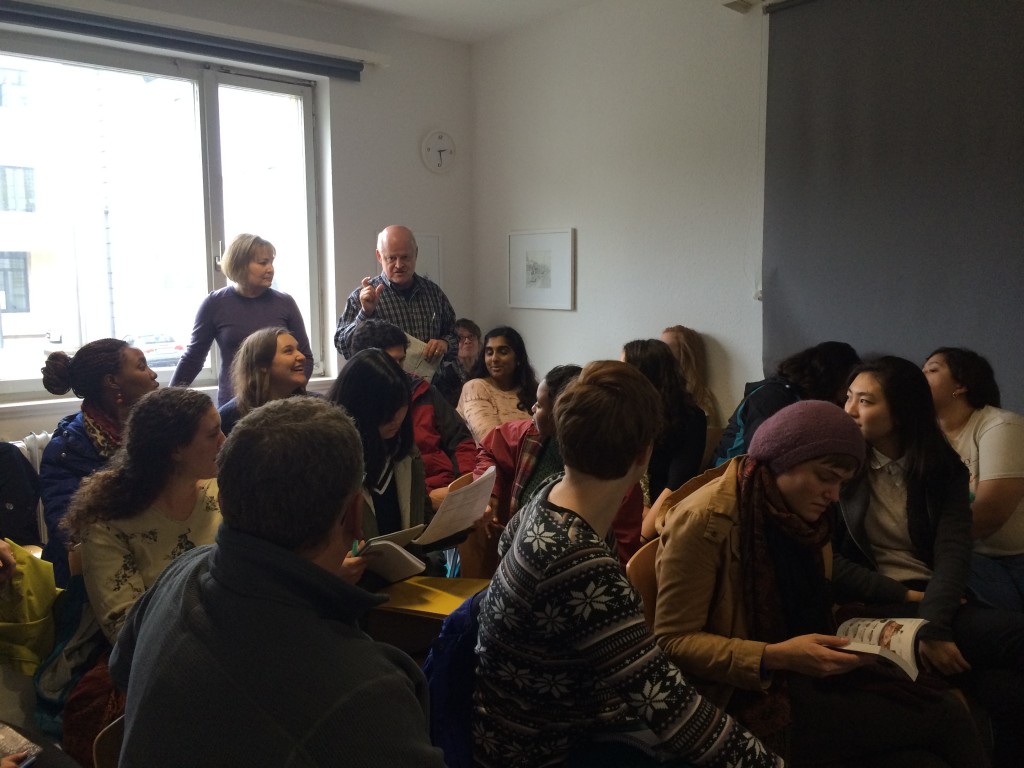 Check in again tomorrow for notes from our visit to a landfill-turned-residential community, and another research facility.
Check in again tomorrow for notes from our visit to a landfill-turned-residential community, and another research facility.
About our guest commentators:
Nicole Hamagami is a senior at Bryn Mawr College. She has been itching to participate in a 360, and was excited to look at the science of climate change from a variety of perspectives. As a Biology major, she learns a lot about scientific absolutes, and has appreciated the opportunities to explore some grey areas. She’s also a campus tour guide, and looks forward to sharing new insights on the Sustainability Tours she gives to prospective students.
Jasmine Rangel is a junior Chemistry major at Bryn Mawr College. She has always been interested in the energy side of chemistry, and a middle school teacher got her passionate about nature, but she was excited to learn more about how people react and respond to new technologies, science, and information in general. Jasmine is also a Traditions Mistress, so while we are in Germany, she’s in the midst of planning Lantern Night too (November 1 – get your lanterns ready!).
Don’s Daily Haiku
Quote
An introduction:
Waste as a resource; ethics,
culture catching fire.
Getting up (and around and over and down and back around) a Hill
I am pleased to report that everyone made it to breakfast this morning, resilient, despite jet lag. After bundling up to face the brisk and cloudy day, we joined our guide from Innovation Academy on a tram ride out to the Forstamnt, about fifteen minutes from the city center.
This is the city-owned edge of the Black Forest, which is in and around Freiburg, meaning that about 40% of the city proper is covered in trees.For our tour of the forest, we were lucky to be hosted by the head ranger, who oversees all the ecological projects and maintenance of the local forest. As he led us up groomed paths and through new growth forest, both of today’s student commentators, Chanel and Meghan, were surprised to hear that “land use isn’t bad, as long as you use it in a sustainable way”. We learned that the forest is both an economic and cultural resource to the region – every five to six years, a single tree in a given section is cleared and sold for timber. Each selection is made after careful analysis of the surrounding growth, consideration for the biodiversity, and value of the wood in question.
In the States, we learn about the differences between conservation and preservation, and I have always considered myself a conservationist. Seeing this perspective, though, has suggested to me that we can and should interact with the land, because it’s there and it’s to be used. It’s interesting to try to have this balance of nature and natural approaches, but in order to keep that, everything has to be actively monitored. How much is it a natural progression and how much do we keep it the same? -Meghan
As our conversation went on, Chanel wondered whether the analytical and economic approach makes the Forstamnt more of a farm than a forest. “They are cultivating things specifically, and it’s all about yield, and what you can extract.” This new perspective on land use and protection of forests will give the students a new lens through which to analyze public policy, they think.
The ranger also emphasized that the forestry work they do is a very long-sighted project. Decisions they make today won’t have particularly visible impacts for 50-60 years, but the citizens are told to trust their expertise. Meghan found this a lot like some of the policies suggested to developing nations – technologies that might raise standards of living are discouraged because industrialized countries have experienced and abused them in their own pasts.
After a few more modes of public transportation, including a gondola ride (shrouded in mist, usually offering a lovely view of the city and surrounding valleys), and a lunch of goulash and spatzle, we hiked to the top of Schauinsland, the highest mountain owned by the city (though not the highest in the region). It also boasts a climate monitoring station with the longest continuous atmospheric CO2 record in Europe – they’ve been keeping data since 1972. Here, the students had a chance to learn about the equipment in use and the different organizations using the data collected there. Chanel noted that one of the scientists there made a similar point to an oft-mentioned concern in their readings, that there is “a difference in improvement of air quality and greenhouse gasses,” the latter being a global problem that “some countries don’t take seriously,” said the scientist.
We left the climate monitoring station and hiked up, over, past goats, around, through a cow pasture, and down the mountain to visit Schneiderlihof, an old farm house now set up as a museum highlighting the farming traditions of the Black Forest. Although the farm wasn’t necessarily sustainable in its functioning days, Meghan sees the self-sufficient mindset of that past carried forward to the present day relationship Germans have to nature and their forests.
Tomorrow, our day is a little more indoors and a little less uphill, as we meet with the founders of the Öko-Institut, a research collective vital to the region’s leadership in sustainable and anti-nuclear energy development.
About our guest commentators:
Meghan Wingate is a junior Political Science major at Haverford College. Growing up in Vermont, she was always casually involved in environmental groups and activities, but coming to Haverford solidified her academic interest too. She regularly wears her environment love on her sleeve, whether she’s studying policy, playing Ultimate with the Bi-Co Sneeches, or working on the Haverford Farm.
Chanel Williams is a senior at Bryn Mawr College. She is a Growth and Structure of Cities major, and also a past 360 participant (read about her class experiences in Hamburg here). As a student from the Bahamas, this cluster was particularly interesting because case studies on the Maldives covered in the Political Science course are echoes of the Bahamanian situation. She’s also an avid swimmer and water polo player, so she has high hopes for global sea level rise.
Don’s Daily Haiku
Quote
Schauinsland shares tales
of pollution and cleansing
in precise detail.
Getting There
The flight to Frankfurt is short, compared to other international jaunts, but add in a two-hour train trip and we have been traveling for a long time. Jiji Plecha, ’18 had felt that “the materials in class have been really clearly related to what we’re going to talk about here on the ground,” but nowhere was that more clear than when she found a personal screen at every airplane seat. “The Philosophy course has been focused on how technology is so deeply integrated into our lives, and when we got on the plane, there were monitors in everyone’s faces.” Of course, some of us spent time looking out the windows anyway.
Though the group did some “getting to know you” exercises before departure, Jiji has been struck by “how much the social groups within the cluster have loosened,” giving everyone a new sense of closeness. She notes that this overlapping is happening in their academic perspectives as well, as they learn from each other’s diverse disciplinary backgrounds.
After arriving in Freiburg, and leaving our luggage at the hotel, we traipsed around the city, led by Professor Bob Dostal (Philosophy), whose research has regularly brought him to the University of Freiburg throughout his career. Jiji notes that the city is different than others she’s encountered in Europe, “because there was so much fighting for influence and jurisdiction, there isn’t a consistent feeling across the city. You can see that particularly in the architecture. Some of the buildings look like they could be in France, which of course, they could be, since we’re so close to the border. The living history of still-bullet-riddled buildings is also striking.”
When we visited the Munster (the medieval cathedral in the center square), “it was interesting to hear about the way the communities came together to take care of the art during the war – taking the stained glass out of the cathedral to preserve it.”
Our evening ended with a group dinner at a traditional German restaurant in the main square – students tried spatzle, as well as a local twist on the classic noodle and a variety of game (wild boar, venison, veal). The winner of the evening, though, may have been the pumpkin soup. Before turning in, Jiji and I chatted about what she’s most looking forward to this trip. As it turns out, she spent part of her junior year of high school researching and writing about biogas digesters, so our visit to a biogas plant next week will be an exciting opportunity to see the concept in person.
Tomorrow, we hike a hill and meet our institutional hosts, the Innovation Academy. Here’s to a full night’s sleep and a good German breakfast!
About our guest commentator:
Jiji Plecha is a sophomore at Bryn Mawr College. She was drawn to this 360 after her ESEM (titled Environmental Social Problems, taught by Sociology professor Nate Wright) helped her to understand how closely the scientific study of environmental issues is related to the sociological and political perspectives. She’s also been long drawn to Philosophy, and enjoyed a previous class with Bob Dostal. When not vascillating between a major in Sociology or Philosophy, she can be found working as a theater technician and stage manager.
Getting Ready
After six weeks of classes, several hundred pages of articles, and one excellent faculty-hosted dinner of German soups and cakes, the fifteen 360 students and their three faculty are finally zipping up their suitcases and double checking passports. While their colleagues and classmates catch up on grading, participate in an externship, or nap with vigor, we will spend Fall Break in Freiburg, a German university town with a history of progressive environmental policy and innovation. Working with Innovation Academy, a local educational non-profit, our group will meet with local activists, scientists, and politicians. Our itinerary includes visits to a working farm, the oldest meteorological collection station in the country, and a solar-powered football (soccer) stadium.
I’m along for the ride as well, to keep track of the train tickets, and to open a window into the meetings and hikes the students take. As the 360 Program coordinator, I’ll endeavor to give you a sense of why we visit the places we do, and each day we will have student commenters to tie their on-the-ground experiences to the academic work they’ve been working on all year. Hopefully, we’ll also be able to show you the beautiful south-west German autumn.
You can catch us on social media under #bmc360. If there are things you’d like to know more about, please ask! Thanks for joining us on this adventure.

